

What is responsible tourism and why does it matter?
Disclaimer: Some posts on Tourism Teacher may contain affiliate links. If you appreciate this content, you can show your support by making a purchase through these links or by buying me a coffee . Thank you for your support!
Responsible tourism is a term we hear thrown about a lot these days, but what does it actually mean to be a responsible tourist? Who needs to be ‘responsible’ and why does responsible tourism matter?
There is no denying the increased recognition amongst tourism industry stakeholders and tourists when it comes to social and corporate responsibility, but the reality is that whilst most of us are familiar with the term ‘responsible tourism’, many of us do not know exactly what this entails…. so in this article I will explain all.
What is responsible tourism?
Responsible tourism definition
What is the difference between responsible tourism and sustainable tourism, the growth of responsible tourism.
Why is responsible tourism important?
How can we be responsible tourists?
How can the tourism industry be more responsible, footsteps ecolodge, the gambia, eden project, cornwall, reality tours and travel, india, dolphin discovery centre, western australia, rancho margot, costa rica, responsible tourism: key takeaways, responsible tourism faqs, responsible tourism: to conclude.

In recent years there has been a clear shift away from the desire to embark on a traditional package holiday , which focusses on the concept of sun, sea and sand towards more experiential travel . Nowadays, many consumers are in search of holidays that provide them with more than two weeks on the beach , and instead are seeking deeper immersive experiences, where there is a greater focus on sustainability. This is coupled with a general trend towards more sustainable living and a greater awareness of the impacts of our actions on society and the natural environment.
In essence, responsible tourism is tourism that exhibits responsible behaviour, both in terms of the tourist and their individual actions, but also in terms of the industry and how the tourism provision is managed. Responsible tourism has become an established area of tourism research and practice and a household term, however the term is somewhat subjective and poorly understood in some contexts.
The definition of responsible tourism, both in theory and practice, has been the subject of debate for many years. The problem lies with the inherent subjectivity surrounding the term responsible- what one person may think is ‘responsible behaviour’, another may not.

Whilst many academics and industry practitioners have attempted to define the term responsible tourism, the most referenced source when it comes to defining the term remains to be the Cape Town Declaration. The 2002 Cape Town Declaration characterises responsible tourism in terms of the following:
- minimising impacts
- generating economic benefits for host communities
- involving local people in decision making
- conserving natural and cultural heritage
- providing meaningful connections between tourists and local people
- being accessible and culturally sensitive
In other words, tourism should encompass aspects of the above in order to be considered ‘responsible’.
Harold Goodwin is one of the key authors who has written about responsible tourism. If you are studying responsible tourism I highly recommend that you cite him in your work! You can find his most recent book here .
Although the term responsible tourism does share much in common with sustainable tourism , ecotourism , ethical tourism and other related forms of socially-conscious tourism, it is NOT the same. This can be quite confusing because oftentimes the terms sustainable tourism and responsible tourism are used interchangeably, but they shouldn’t be.

As I explain in detail in my article on sustainable tourism , there are three pillars to sustainable tourism- the environment, society and the economy. The World Tourism Organisation prescribes that sustainable tourism should:
- Make optimal use of environmental resources that constitute a key element in tourism development, maintaining essential ecological processes and helping to conserve natural heritage and biodiversity.
- Respect the socio-cultural authenticity of host communities, conserve their built and living cultural heritage and traditional values, and contribute to inter-cultural understanding and tolerance.
- Ensure viable, long-term economic operations, providing socio-economic benefits to all stakeholders that are fairly distributed, including stable employment and income-earning opportunities and social services to host communities, and contributing to poverty alleviation.
Whilst there are clear aims of sustainable tourism, when it comes to responsible tourism the definition is a bit more loose, without such transparent prerequisites and instead relying on the premise of simply ‘being responsible’. In other words, responsible tourism will often encompass the elements noted above, but these are not essential.

The concept of responsible tourism may be in the public mind more now than ever before, but it isn’t new. The vision of a more responsible form of tourism was discussed at length back in the 1980s and became an important element within the fast emerging concept of sustainable tourism. More than twenty five years ago it was noted that the industry would have to adopt more environmentally orientated and socially responsible practices, yet this has only really become prominent in the past decade.
According to a study undertaken by Booking.com in 2020, over half (53%) of tourists around the world want to travel more sustainably in the future. The company, along with many other industry professionals-myself included- expects to see a more eco-conscious mindset in future years. Whilst there was a general shift towards a more sustainable mindset anyway, this was amplified by the COVID pandemic, as coronavirus amped people’s awareness of their impact on the environment and local communities.

Nowadays, the label of ‘responsible tourism’ is by far the most well-used sustainability-focussed term throughout the travel and tourism industry. In fact, a study undertaken in 2009 by SNV suggests that tour operators are almost five times as likely to use the term ‘responsible tourism’ than any other similar label (e.g. ecotourism, sustainable tourism, ethical tourism). Sadly, the subjectivity of the term does allow room for the term itself to be used exploited and for greenwashing to occur, but that’s a discussion for another day.
The UNWTO Secretary-General Zurab Pololikashvili stated , quite rightly, that:
‘ Sustainability must no longer be a niche part of tourism but the new norm for every part of our sector. That means an opportunity to build back better and create and industry that is more resilient and aligned with the UN’s Sustainable Development Goals . ‘
The tourism industry is arguably the biggest industry in the world and it has been growing at a rapid rate over the past few decades. Unfortunately, as the industry has grown around the world, so have the negative impacts that it causes. Whilst the pandemic has been a disaster for the tourism industry and those whose livelihoods depend on it, it has also presented us with a unique opportunity to fix what was/is broken.
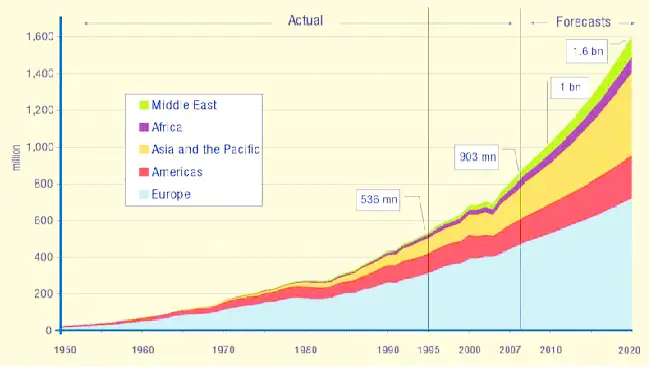
From the depths of the Amazon jungle to the Australian outback, there are few places in the world that have escaped the burgeoning growth of the travel and tourism industry. Unfortunately, in many cases, this has come at the expense of natural resources, local economies and indigenous populations. Responsible tourism is all about minimising these negative impacts (think erosion, littering, rises in crime, deterioration of authenticity , economic leakage and so on) and capitalising on the good stuff- the economic benefits, the preservation of natural areas and the promotion of culture and heritage, amongst other positive impacts of tourism.
Ultimately, if we want to preserve the very things that it is we are going to see (the beach, the mountain, the wildlife etc) for future generations, then we need to behave responsibly and sustainably- that’s why responsible tourism isn’t just important- it’s imperative.

We all need to think about the impacts that our actions have on the world around us. Yes, it is extremely difficult (if possible at all) to be 100% responsible for 100% of the time. BUT, there are many things that we CAN do to help to protect and preserve the environment, society and the economy. You can read a detailed account of how to be an ethical tourist here , but for now I will list a few subtle changes that you can make to help be a more responsible tourist when you travel:
- Don’t buy animal souvenirs
- Avoid unethical wildlife tourism
- Don’t drop litter
- Don’t touch coral
- Try slow tourism
- Opt for eco-friendly transportation options
- Turn off the lights
- Try ecotourism
- Avoid plastic
- Recycle
- Don’t waste water
- Stick to main paths
- Limit economic leakage where you can
- Haggle fairly
- Learn the local language
- Be respectful of local customs and traditions
- Don’t give to beggars
- Treat people fairly
- Avoid sex tourism
- Don’t take photos of people without their permission

A key aspect to ensuring sustainable tourism is achieved is through careful planning and management. Tourism industry stakeholders at all levels, ranging from the taxi driver and hotel staff at grass roots level, through to international organisations and national Government, have an obligation to facilitate responsible tourism. There are many examples of what responsible behaviour from the tourism industry might look like in practice, but here are a few to give you an idea:
- Hire local staff
- Use local products and services to minimise economic leakage
- Use ethical marketing and promotion
- Involve the local community in decision making
- Have a strong sense of corporate social responsibility
- Use environmentally friendly products and services
- Limited economic leakage
- Educate workers
- Offer training and development opportunities for staff
- Work together with other industry stakeholders
Examples of responsible tourism
There are examples of responsible tourism from all over the world! However, to give you an idea of what responsible tourism looks like in practice, I have given a few examples for you below. (Note- these can also be classified as examples of sustainable tourism .)
My first example of sustainable tourism is Footsteps Ecolodge , which I visited back in 2010.
David, the Founder of Footsteps Ecolodge expresses how when he took a relatively cheap trip to The Gambia, he discovered that the staff at his booked hotel were only earning on average £1 per day. David felt guilty for enjoying a holiday knowing that the locals were receiving little or no economic benefits at all from hosting him.
David went on to develop Footsteps Ecolodge, with a mission to improve The Gambia’s trade through responsible tourism and therefore encourages sustainable development. In fact, one of his goals has led footsteps to employ only from the local village and buy only local produce.
I loved visiting this ecolodge. It has many environmentally friendly initiatives, ranging from solar powered electricity to composting toilets. It is based far away from the main tourist areas, providing a unique and authentic holiday experience. After spending a few days in the main tourist resort of Kotu, I was happy to exchange the evening chatter in the restaurants for the humming of grasshoppers and the beach bar music for the gentle sounds of waves.
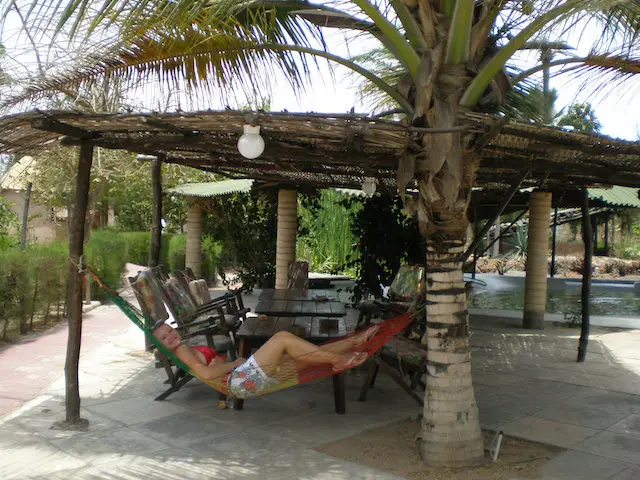
You can book a stay at Footsteps Ecolodge here .
The Eden Project is another great example of sustainable tourism.
It was built to demonstrate the importance of plants to people and to promote the understanding of vital relationships between plants and people. It is a huge complex that welcomes a wide range of tourists from the UK and overseas. In 2017, the project attracted more than o ne million visitors.
The project in fact has annual sustainability reports, monitoring its sustainable impact year on year.
You can find out more about the Eden Project in this video.
Reality Tours and Travel’s mission is to provide authentic and thought-provoking local experiences through their tours and to use the profits to create change in Indian communities.
Reality Tours and Travel is a social catalyst and works towards profit sharing programs. 80% of their profits go directly to Reality Gives which runs high quality education programs in areas where their tours work.
Reality Tours and Travel now welcomes over 15,000 guests each year and employs over 50 members of staff. Here is a bit more information about the work that they do.
The Dolphin Discovery Centre begun when Mrs Evelyn Smith begun to feed a group of dolphins near her home. Following her discovery of the dolphin grouping, specialists were brought in to monitor and study the local dolphins.
A few years later, the Dolphin Discovery Centre allowed tourists and community members to interact with the dolphins in hope they would understand and enjoy the marine mammals.
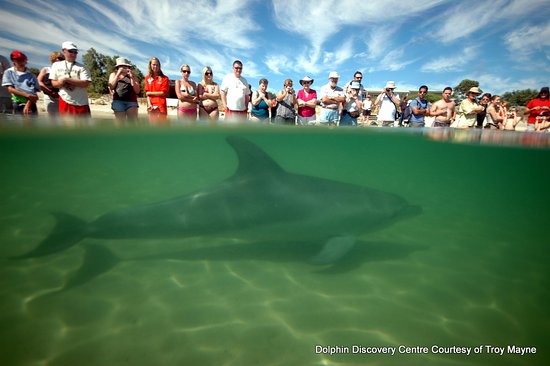
In brief, the Dolphin Discovery Centre Adopt a Dolphin Program supports the conservation of dolphins and the broader marine environment.
To date, the Dolphin Discovery Centre not only conserves dolphins, the centre also conserves turtles too. Learn more on adopting a dolphin or turtle with the Dolphin Discovery Centre here.
Ranch Margot is exactly what it sounds, a ranch located in Costa Rica. It all begun in 2004 when the founder of Rancho Margot, Juan Sostheim, purchased 400 acres of pasture. Despite the land being cleared of all vegetation, Juan Sostheim had a vision to grow sustainable food and raising animals.
Today, Rancho Margot focuses specifically on sustainable production and living, from the food they delivery to their energy production and the transportation used. Read more on Rancho Margot here.
Rancho Margot’s sustainable mission is in keeping with the Brundtland Report.
“To achieve and maintain sustainable operations, we work to find better ways to satisfy our needs without compromising future generations”
Whilst I didn’t get a chance got visit Rancho Margot during our travels through Costa Rica , it does look like a fantastic place to go and a great example of sustainable tourism.
Now that we know a bit more about what responsible tourism is and how it works, lets summarise the key takeaways:
- Responsible tourism involves making ethical and sustainable choices when traveling.
- It is important to respect local cultures, traditions, and customs when visiting a new place.
- Supporting local communities by buying locally-made products and using locally-owned businesses can have a positive impact on the local economy.
- Minimising your carbon footprint by using eco-friendly transportation options and reducing waste can help reduce the impact of tourism on the environment.
- Being mindful of the impact of your visit on the local environment and taking steps to minimise damage, such as not littering or damaging natural habitats, is important.
- Learning about the history and culture of the destination you are visiting can help you appreciate and respect it more.
- Engaging in ethical wildlife tourism , such as visiting sanctuaries and conservation centres, can help support animal welfare and conservation efforts.
- Respecting the privacy and dignity of local people is important when taking photographs or engaging in other tourist activities.
- Supporting responsible tourism organisations and initiatives can help promote sustainable and ethical tourism practices.
- Ultimately, responsible tourism involves making conscious and informed decisions that benefit the destination and its people, while minimising negative impacts on the environment and local communities.
Lastly, lets finish off this article by answering some of the most common questions on this topic.
Responsible tourism is a type of tourism that aims to promote ethical and sustainable practices that benefit local communities and minimise negative impacts on the environment.
Responsible tourism is important because it helps promote sustainable and ethical practices in the tourism industry, which can benefit both the environment and local communities.
How can I engage in responsible tourism?
You can engage in responsible tourism by being mindful of your impact on the environment and local communities, supporting local businesses, and engaging in ethical and sustainable tourism practices.
What are some examples of responsible tourism practices?
Examples of responsible tourism practices include buying locally-made products, using eco-friendly transportation options, supporting wildlife conservation efforts, and respecting local cultures and traditions.
How can tourism negatively impact local communities?
Tourism can negatively impact local communities through overdevelopment, cultural commodification , and economic exploitation.
Can responsible tourism benefit local communities?
Yes, responsible tourism can benefit local communities by supporting local businesses and creating job opportunities.
What is eco-tourism?
Eco-tourism is a type of responsible tourism that focuses on visiting natural areas in a way that is environmentally friendly and supports conservation efforts.
Can responsible tourism help reduce the negative impact of tourism on the environment ?
Yes, responsible tourism can help reduce the negative impact of tourism on the environment by promoting sustainable practices such as reducing waste and using eco-friendly transportation options.
Is responsible tourism more expensive than traditional tourism?
Responsible tourism may not necessarily be more expensive than traditional tourism, as it depends on the specific activities and accommodations chosen.
What is the role of governments and tourism organisations in promoting responsible tourism?
Governments and tourism organisations have a role in promoting responsible tourism by creating policies and guidelines that encourage sustainable and ethical practices , and by educating tourists on responsible tourism practices.
As you can see, responsible tourism is very important to ensure that the tourism industry is sustainable. To learn more about this, visit the articles listed below:
- Ethical tourism: Everything you need to know
- Agritourism: What, where and why
- The rise of revenge tourism
- Educational tourism: Everything you need to know
Liked this article? Click to share!
How global tourism can become more sustainable, inclusive and resilient

A sanitary mask lies on the ground at Frankfurt Airport Image: Reuters/Ralph Orlowski
.chakra .wef-1c7l3mo{-webkit-transition:all 0.15s ease-out;transition:all 0.15s ease-out;cursor:pointer;-webkit-text-decoration:none;text-decoration:none;outline:none;color:inherit;}.chakra .wef-1c7l3mo:hover,.chakra .wef-1c7l3mo[data-hover]{-webkit-text-decoration:underline;text-decoration:underline;}.chakra .wef-1c7l3mo:focus,.chakra .wef-1c7l3mo[data-focus]{box-shadow:0 0 0 3px rgba(168,203,251,0.5);} Ahmed Al-Khateeb

.chakra .wef-9dduvl{margin-top:16px;margin-bottom:16px;line-height:1.388;font-size:1.25rem;}@media screen and (min-width:56.5rem){.chakra .wef-9dduvl{font-size:1.125rem;}} Explore and monitor how .chakra .wef-15eoq1r{margin-top:16px;margin-bottom:16px;line-height:1.388;font-size:1.25rem;color:#F7DB5E;}@media screen and (min-width:56.5rem){.chakra .wef-15eoq1r{font-size:1.125rem;}} The Great Reset is affecting economies, industries and global issues

.chakra .wef-1nk5u5d{margin-top:16px;margin-bottom:16px;line-height:1.388;color:#2846F8;font-size:1.25rem;}@media screen and (min-width:56.5rem){.chakra .wef-1nk5u5d{font-size:1.125rem;}} Get involved with our crowdsourced digital platform to deliver impact at scale
Stay up to date:, the great reset.
- Tourism rose to the forefront of the global agenda in 2020, due to the devastating impact of COVID-19
- Recovery will be driven by technology and innovation – specifically seamless travel solutions, but it will be long, uneven and slow
- Success hinges on international coordination and collaboration across the public and private sectors
Tourism was one of the sectors hit hardest by the global pandemic. 2020 was the worst year on record for international travel due to the global pandemic, with countries taking decisive action to protect their citizens, closing borders and halting international travel.
The result was a 74% decline in international visitor arrivals, equivalent to over $1 trillion revenue losses , and an estimated 62 million fewer jobs . The impact on international air travel has been even more severe with a 90% drop on 2019 , resulting in a potential $1.8 trillion loss. And while the economic impact is dire in itself, nearly 2.9 million lives have been lost in the pandemic.
The path to recovery will be long and slow
Countries now face the challenge of reopening borders to resume travel and commerce, while protecting their populations’ health. At its peak, the World Tourism Organization (UNWTO) reported in April 2020 that every country on earth had implemented some travel restriction , signalling the magnitude of the operation to restart travel.
Have you read?
Tourism industry experts fear long road to recovery, how we can prioritize sustainability in rebuilding tourism, covid-19 could set the global tourism industry back 20 years.
Consequently, the path to recovery will be long and slow. The resurgence of cases following the discovery of new variants towards the end of last year delivered another disappointing blow to the travel industry. Any pickup over the summer months was quashed following a second wave of lockdowns and border closures . Coupled with mixed progress in the roll-out of vaccination programs, I predict that we will not see a significant rebound in international travel until the middle of this year at best.
Others echo my fears. The International Air Transport Association (IATA) forecasts a 50.4% improvement on 2020 air travel demand, which would bring the industry to 50.6% of 2019 levels . However, a more pessimistic outlook based on the persistence of travel restrictions suggests that demand may only pick up by 13% this year, leaving the industry at 38% of 2019 levels. McKinsey & Company similarly predict that tourism expenditure may not return to pre-COVID-19 levels until 2024 .
How to enhance sustainability, inclusivity and resilience
Given its economic might – employing 330 million people, contributing 10% to global GDP before the pandemic, and predicted to create 100 million new jobs – restoring the travel and tourism sector to a position of strength is the utmost priority.
The Great Reset provides an opportunity to rethink how tourism is delivered and to enhance sustainability, inclusivity and resilience. We must also address the challenges – from climate change and “ overtourism ” to capacity constraints – that we faced before the pandemic, while embracing traveller preferences, as we rebuild.
A 2018 study found that global tourism accounted for 8% of global greenhouse gas emissions from 2009 to 2013 ; four times higher than previous estimates. Even more worryingly, this puts progress towards the Paris Agreement at risk – recovery efforts must centre around environmental sustainability.
Furthermore, according to a study on managing overcrowding, the top 20 most popular global destinations were predicted to add more international arrivals than the rest of the world combined by 2020 . While COVID-19 will have disrupted this trend, it is well known that consumers want to travel again, and we must address the issues associated with overcrowding, especially in nascent destinations, like Saudi Arabia.
The Great Reset is a chance to make sure that as we rebuild, we do it better.

Seamless solutions lie at the heart of travel recovery
Tourism has the potential to be an engine of economic recovery provided we work collaboratively to adopt a common approach to a safe and secure reopening process – and conversations on this are already underway.
Through the G20, which Saudi Arabia hosted in 2020, our discussions focused on how to leverage technology and innovation in response to the crisis, as well as how to restore traveller confidence and improve the passenger experience in the future .
At the global level, across the public and private sectors, the World Economic Forum is working with the Commons Project on the CommonPass framework , which will allow individuals to access lab results and vaccination records, and consent to having that information used to validate their COVID status. IATA is trialling the Travel Pass with airlines and governments , which seeks to be a global and standardized solution to validate and authenticate all country regulations regarding COVID-19 travel requirements.
The provision of solutions that minimize person-to-person contact responds to consumer wants, with IATA finding that 85% of travellers would feel safer with touchless processing . Furthermore, 44% said they would share personal data to enable this, up from 30% months prior , showing a growing trend for contactless travel processes.
Such solutions will be critical in coordinating the opening of international borders in a way that is safe, seamless and secure, while giving tourists the confidence to travel again.
Collaboration at the international level is critical
The availability of vaccines will make this easier, and we have commenced our vaccination programme in Saudi Arabia . But we need to ensure processes and protocols are aligned globally, and that we support countries with limited access to vaccinations to eliminate the threat of another resurgence. It is only when businesses and travellers have confidence in the systems that the sector will flourish again.
In an era of unprecedented data and ubiquitous intelligence, it is essential that organizations reimagine how they manage personal data and digital identities. By empowering individuals and offering them ways to control their own data, user-centric digital identities enable trusted physical and digital interactions – from government services or e-payments to health credentials, safe mobility or employment.

The World Economic Forum curates the Platform for Good Digital Identity to advance global digital identity activities that are collaborative and put the user interest at the center.
The Forum convenes public-private digital identity collaborations from travel, health, financial services in a global action and learning network – to understand common challenges and capture solutions useful to support current and future coalitions. Additionally, industry-specific models such as Known Traveller Digital Identity or decentralized identity models show that digital identity solutions respecting the individual are possible.
The approach taken by Saudi Arabia and its partners to establish consensus and build collaborative relationships internationally and between the public and private sectors, should serve as a model to be replicated so that we can maximize the tourism sector’s contribution to the global economic recovery, while ensuring that it becomes a driver of prosperity and social progress again.
Don't miss any update on this topic
Create a free account and access your personalized content collection with our latest publications and analyses.
License and Republishing
World Economic Forum articles may be republished in accordance with the Creative Commons Attribution-NonCommercial-NoDerivatives 4.0 International Public License, and in accordance with our Terms of Use.
The views expressed in this article are those of the author alone and not the World Economic Forum.
Related topics:
The agenda .chakra .wef-n7bacu{margin-top:16px;margin-bottom:16px;line-height:1.388;font-weight:400;} weekly.
A weekly update of the most important issues driving the global agenda
.chakra .wef-1dtnjt5{display:-webkit-box;display:-webkit-flex;display:-ms-flexbox;display:flex;-webkit-align-items:center;-webkit-box-align:center;-ms-flex-align:center;align-items:center;-webkit-flex-wrap:wrap;-ms-flex-wrap:wrap;flex-wrap:wrap;} More on Industries in Depth .chakra .wef-17xejub{-webkit-flex:1;-ms-flex:1;flex:1;justify-self:stretch;-webkit-align-self:stretch;-ms-flex-item-align:stretch;align-self:stretch;} .chakra .wef-nr1rr4{display:-webkit-inline-box;display:-webkit-inline-flex;display:-ms-inline-flexbox;display:inline-flex;white-space:normal;vertical-align:middle;text-transform:uppercase;font-size:0.75rem;border-radius:0.25rem;font-weight:700;-webkit-align-items:center;-webkit-box-align:center;-ms-flex-align:center;align-items:center;line-height:1.2;-webkit-letter-spacing:1.25px;-moz-letter-spacing:1.25px;-ms-letter-spacing:1.25px;letter-spacing:1.25px;background:none;padding:0px;color:#B3B3B3;-webkit-box-decoration-break:clone;box-decoration-break:clone;-webkit-box-decoration-break:clone;}@media screen and (min-width:37.5rem){.chakra .wef-nr1rr4{font-size:0.875rem;}}@media screen and (min-width:56.5rem){.chakra .wef-nr1rr4{font-size:1rem;}} See all

The energy transition could shift the global power centre. This expert explains why
Liam Coleman
June 4, 2024

Top 5 countries leading the sustainable tourism sector

Robot rock stars, pocket forests, and the battle for chips - Forum podcasts you should hear this month
Robin Pomeroy and Linda Lacina
April 29, 2024

Agritech: Shaping Agriculture in Emerging Economies, Today and Tomorrow

Confused about AI? Here are the podcasts you need on artificial intelligence
Robin Pomeroy
April 25, 2024

Which technologies will enable a cleaner steel industry?
Daniel Boero Vargas and Mandy Chan
Sustainable tourism
Related sdgs, promote sustained, inclusive and sustainable ....

Description
Publications.
Tourism is one of the world's fastest growing industries and an important source of foreign exchange and employment, while being closely linked to the social, economic, and environmental well-being of many countries, especially developing countries. Maritime or ocean-related tourism, as well as coastal tourism, are for example vital sectors of the economy in small island developing States (SIDS) and coastal least developed countries (LDCs) (see also: The Potential of the Blue Economy report as well as the Community of Ocean Action on sustainable blue economy).
The World Tourism Organization defines sustainable tourism as “tourism that takes full account of its current and future economic, social and environmental impacts, addressing the needs of visitors, the industry, the environment and host communities".
Based on General assembly resolution 70/193, 2017 was declared as the International Year of Sustainable Tourism for Development.
In the 2030 Agenda for Sustainable Development SDG target 8.9, aims to “by 2030, devise and implement policies to promote sustainable tourism that creates jobs and promotes local culture and products”. The importance of sustainable tourism is also highlighted in SDG target 12.b. which aims to “develop and implement tools to monitor sustainable development impacts for sustainable tourism that creates jobs and promotes local culture and products”.
Tourism is also identified as one of the tools to “by 2030, increase the economic benefits to Small Island developing States and least developed countries” as comprised in SDG target 14.7.
In the Rio+20 outcome document The Future We want, sustainable tourism is defined by paragraph 130 as a significant contributor “to the three dimensions of sustainable development” thanks to its close linkages to other sectors and its ability to create decent jobs and generate trade opportunities. Therefore, Member States recognize “the need to support sustainable tourism activities and relevant capacity-building that promote environmental awareness, conserve and protect the environment, respect wildlife, flora, biodiversity, ecosystems and cultural diversity, and improve the welfare and livelihoods of local communities by supporting their local economies and the human and natural environment as a whole. ” In paragraph 130, Member States also “call for enhanced support for sustainable tourism activities and relevant capacity-building in developing countries in order to contribute to the achievement of sustainable development”.
In paragraph 131, Member States “encourage the promotion of investment in sustainable tourism, including eco-tourism and cultural tourism, which may include creating small- and medium-sized enterprises and facilitating access to finance, including through microcredit initiatives for the poor, indigenous peoples and local communities in areas with high eco-tourism potential”. In this regard, Member States also “underline the importance of establishing, where necessary, appropriate guidelines and regulations in accordance with national priorities and legislation for promoting and supporting sustainable tourism”.
In 2002, the World Summit on Sustainable Development in Johannesburg called for the promotion of sustainable tourism development, including non-consumptive and eco-tourism, in Chapter IV, paragraph 43 of the Johannesburg Plan of Implementation.
At the Johannesburg Summit, the launch of the “Sustainable Tourism – Eliminating Poverty (ST-EP) initiative was announced. The initiative was inaugurated by the World Tourism Organization, in collaboration with UNCTAD, in order to develop sustainable tourism as a force for poverty alleviation.
The UN Commission on Sustainable Development (CSD) last reviewed the issue of sustainable tourism in 2001, when it was acting as the Preparatory Committee for the Johannesburg Summit.
The importance of sustainable tourism was also mentioned in Agenda 21.
For more information and documents on this topic, please visit this link
UNWTO Annual Report 2016
In December 2015, the United Nations General Assembly declared 2017 as the International Year of Sustainable Tourism for Development. This is a unique opportunity to devote a year to activities that promote the transformational power of tourism to help us reach a better future. This important cele...
UNWTO Annual Report 2015
2015 was a landmark year for the global community. In September, the 70th Session of the United Nations General Assembly adopted the Sustainable Development Goals (SDGs), a universal agenda for planet and people. Among the 17 SDGs and 169 associated targets, tourism is explicitly featured in Goa...
Emerging Issues for Small Island Developing States
The 2012 UNEP Foresight Process on Emerging Global Environmental Issues primarily identified emerging environmental issues and possible solutions on a global scale and perspective. In 2013, UNEP carried out a similar exercise to identify priority emerging environmental issues that are of concern to ...
Transforming our World: The 2030 Agenda for Sustainable Development
This Agenda is a plan of action for people, planet and prosperity. It also seeks to strengthen universal peace in larger freedom, We recognize that eradicating poverty in all its forms and dimensions, including extreme poverty, is the greatest global challenge and an indispensable requirement for su...
Status and Trends of Caribbean Coral Reefs: 1970-2012
Previous Caribbean assessments lumped data together into a single database regardless of geographic location, reef environment, depth, oceanographic conditions, etc. Data from shallow lagoons and back reef environments were combined with data from deep fore-reef environments and atolls. Geographic c...
15 Years of the UNWTO World Tourism Network on Child Protection: A Compilation of Good Practices
Although it is widely recognized that tourism is not the cause of child exploitation, it can aggravate the problem when parts of its infrastructure, such as transport networks and accommodation facilities, are exploited by child abusers for nefarious ends. Additionally, many other factors that contr...
Towards Measuring the Economic Value of Wildlife Watching Tourism in Africa
Set against the backdrop of the ongoing poaching crisis driven by a dramatic increase in the illicit trade in wildlife products, this briefing paper intends to support the ongoing efforts of African governments and the broader international community in the fight against poaching. Specifically, this...
Natural Resources Forum: Special Issue Tourism
The journal considers papers on all topics relevant to sustainable development. In addition, it dedicates series, issues and special sections to specific themes that are relevant to the current discussions of the United Nations Commission on Sustainable Development (CSD)....
Thailand: Supporting Sustainable Development in Thailand: A Geographic Clusters Approach
Market forces and government policies, including the Tenth National Development Plan (2007-2012), are moving Thailand toward a more geographically specialized economy. There is a growing consensus that Thailand’s comparative and competitive advantages lie in amenity services that have high reliance...
Natural Resources Forum, a United Nations Sustainable Development Journal (NRF)
Natural Resources Forum, a United Nations Sustainable Development Journal, seeks to address gaps in current knowledge and stimulate relevant policy discussions, leading to the implementation of the sustainable development agenda and the achievement of the Sustainable...
Road Map on Building a Green Economy for Sustainable Development in Carriacou and Petite Martinique, Grenada
This publication is the product of an international study led by the Division for Sustainable Development (DSD) of the United Nations Department of Economic and Social Affairs (UNDESA) in cooperation with the Ministry of Carriacou and Petite Martinique Affairs and the Ministry of Environment, Foreig...
UN Ocean Conference 2025
Our Ocean, Our Future, Our Responsibility “The ocean is fundamental to life on our planet and to our future. The ocean is an important source of the planet’s biodiversity and plays a vital role in the climate system and water cycle. The ocean provides a range of ecosystem services, supplies us with
UN Ocean Conference 2022
The UN Ocean Conference 2022, co-hosted by the Governments of Kenya and Portugal, came at a critical time as the world was strengthening its efforts to mobilize, create and drive solutions to realize the 17 Sustainable Development Goals by 2030.
58th Session of the Commission for Social Development – CSocD58
22nd general assembly of the united nations world tourism organization, world tourism day 2017 official celebration.
This year’s World Tourism Day, held on 27 September, will be focused on Sustainable Tourism – a Tool for Development. Celebrated in line with the 2017 International Year of Sustainable Tourism for Development, the Day will be dedicated to exploring the contribution of tourism to the Sustainable Deve
World Tourism Day 2016 Official Celebration
Accessible Tourism for all is about the creation of environments that can cater for the needs of all of us, whether we are traveling or staying at home. May that be due to a disability, even temporary, families with small children, or the ageing population, at some point in our lives, sooner or late
4th Global Summit on City Tourism
The World Tourism Organisation (UNWTO) and the Regional Council for Tourism of Marrakesh with support of the Government of Morroco are organizing the 4th Global Summit on City Tourism in Marrakesh, Morroco (9-10 December 2015). International experts in city tourism, representatives of city DMOs, of
2nd Euro-Asian Mountain Resorts Conference
The World Tourism Organisation (UNWTO) and Ulsan Metropolitan City with support of the Government of the Republic of Korea are organizing the 2nd Euro-Asian Mountain Resorts Conference, in Ulsan, Republic of Korea (14 - 16 October 2015). Under the title “Paving the Way for a Bright Future for Mounta
21st General Assembly of the United Nations World Tourism Organization
Unwto regional conference enhancing brand africa - fostering tourism development.
Tourism is one of the Africa’s most promising sectors in terms of development, and represents a major opportunity to foster inclusive development, increase the region’s participation in the global economy and generate revenues for investment in other activities, including environmental preservation.
- January 2017 International Year of Tourism In the context of the universal 2030 Agenda for Sustainable Development and the Sustainable Development Goals (SDGs), the International Year aims to support a change in policies, business practices and consumer behavior towards a more sustainable tourism sector that can contribute to the SDGs.
- January 2015 Targets 8.9, 12 b,14.7 The 2030 Agenda for Sustainable Development commits Member States, through Sustainable Development Goal Target 8.9 to “devise and implement policies to promote sustainable tourism that creates jobs and promotes local culture and products”. The importance of sustainable tourism, as a driver for jobs creation and the promotion of local culture and products, is also highlighted in Sustainable Development Goal target 12.b. Tourism is also identified as one of the tools to “increase [by 2030] the economic benefits to Small Island developing States and least developed countries”, through Sustainable Development Goals Target 14.7.
- January 2012 Future We Want (Para 130-131) Sustainable tourism is defined as a significant contributor “to the three dimensions of sustainable development” thanks to its close linkages to other sectors and its ability to create decent jobs and generate trade opportunities. Therefore, Member States recognize “the need to support sustainable tourism activities and relevant capacity-building that promote environmental awareness, conserve and protect the environment, respect wildlife, flora, biodiversity, ecosystems and cultural diversity, and improve the welfare and livelihoods of local communities” as well as to “encourage the promotion of investment in sustainable tourism, including eco-tourism and cultural tourism, which may include creating small and medium sized enterprises and facilitating access to finance, including through microcredit initiatives for the poor, indigenous peoples and local communities in areas with high eco-tourism potential”.
- January 2009 Roadmap for Recovery UNWTO announced in March 2009 the elaboration of a Roadmap for Recovery to be finalized by UNWTO’s General Assembly, based on seven action points. The Roadmap includes a set of 15 recommendations based on three interlocking action areas: resilience, stimulus, green economy aimed at supporting the tourism sector and the global economy.
- January 2008 Global Sustainable Tourism Criteria The Global Sustainable Tourism Criteria represent the minimum requirements any tourism business should observe in order to ensure preservation and respect of the natural and cultural resources and make sure at the same time that tourism potential as tool for poverty alleviation is enforced. The Criteria are 41 and distributed into four different categories: 1) sustainability management, 2) social and economic 3) cultural 4) environmental.
- January 2003 1st Int. Conf. on Climate Change and Tourism The conference was organized in order to gather tourism authorities, organizations, businesses and scientists to discuss on the impact that climate change can have on the tourist sector. The event took place from 9 till 11 April 2003 in Djerba, Tunisia.
- January 2003 WTO becomes a UN specialized body By Resolution 453 (XV), the Assembly agreed on the transformation of the WTO into a United Nations specialized body. Such transformation was later ratified by the United Nations General Assembly with the adoption of Resolution A/RES/58/232.
- January 2002 World Ecotourism Summit Held in May 2002, in Quebec City, Canada, the Summit represented the most important event in the framework of the International Year of Ecosystem. The Summit identified as main themes: ecotourism policy and planning, regulation of ecotourism, product development, marketing and promotion of ecotourism and monitoring costs and benefits of ecotourism.
- January 1985 Tourism Bill of Rights and Tourist Code At the World Tourism Organization Sixth Assembly held in Sofia in 1985, the Tourism Bill of Rights and Tourist Code were adopted, setting out the rights and duties of tourists and host populations and formulating policies and action for implementation by states and the tourist industry.
- January 1982 Acapulco Document Adopted in 1982, the Acapulco Document acknowledges the new dimension and role of tourism as a positive instrument towards the improvement of the quality of life for all peoples, as well as a significant force for peace and international understanding. The Acapulco Document also urges Member States to elaborate their policies, plans and programmes on tourism, in accordance with their national priorities and within the framework of the programme of work of the World Tourism Organization.

Our Approach
At the Center for Responsible Travel (CREST), we’re passionate about transforming the way the world travels. Our mission is to serve as a center of tourism knowledge, empowerment, and action for destination communities. We envision a world where travel benefits both people and the planet, fostering a sustainable, inclusive, and environmentally responsible future for all.
We understand that irresponsible tourism can exacerbate pressing challenges, such as overtourism, climate change acceleration, inequality and poverty, and the loss of biodiversity and cultural heritage. To tackle these issues, we’ve developed a comprehensive 4-pillar approach:
- Applied Research : We are a dynamic hub for groundbreaking and practical tourism research. We bridge the gap between academia and the private sector, providing practitioners with accessible resources, cutting-edge tourism trends, and tools to more responsibly manage their destinations, community nonprofits, and businesses.
- Destination Stewardship : We champion the cause of responsible tourism by encouraging destinations to prioritize stewardship over mere management and marketing. Our hands-on approach to destination stewardship planning, implementation, and fundraising fosters community participation, sustainable development, and environmental conservation.
- Advocacy & Systems Change : By uniting diverse tourism stakeholders, we strive to transform the industry’s paradigm and promote more responsible practices. We cultivate meaningful dialogue, advocate for progressive regulations, and nurture powerful cross-sector partnerships to drive collective action.
- Education & Events : Lifelong learning is at the heart of our mission. Through speaking forums, events, and our academic affiliates network, we foster knowledge-sharing, capacity-building, and resource development for leaders and community members across the tourism value chain.
With this approach, we are dedicated to helping communities, businesses, and destinations adopt responsible tourism policies and practices. Our strategic collaborations, meticulous research, and community-driven field projects aim to make a lasting, positive impact on the tourism industry.
We invite you to join us on this journey towards a more sustainable, equitable, and environmentally conscious future for travel. Explore our website to learn more about our initiatives, and discover how you can become a part of the movement for responsible tourism.
Together, we can create a world where travel truly benefits communities and the environment.

Carbon Footprint of Tourism
How travel contributes to the climate emergency.
Tourism is responsible for roughly 8% of the world’s carbon emissions. From plane flights and boat rides to souvenirs and lodging, various activities contribute to tourism’s carbon footprint. The majority of this footprint is emitted by visitors from high-income countries, with U.S. travelers at the top of the list. As the number of people who can afford to travel grows, so will tourism’s environmental footprint.
Keep reading to learn about some of the different ways that travel produces CO2.
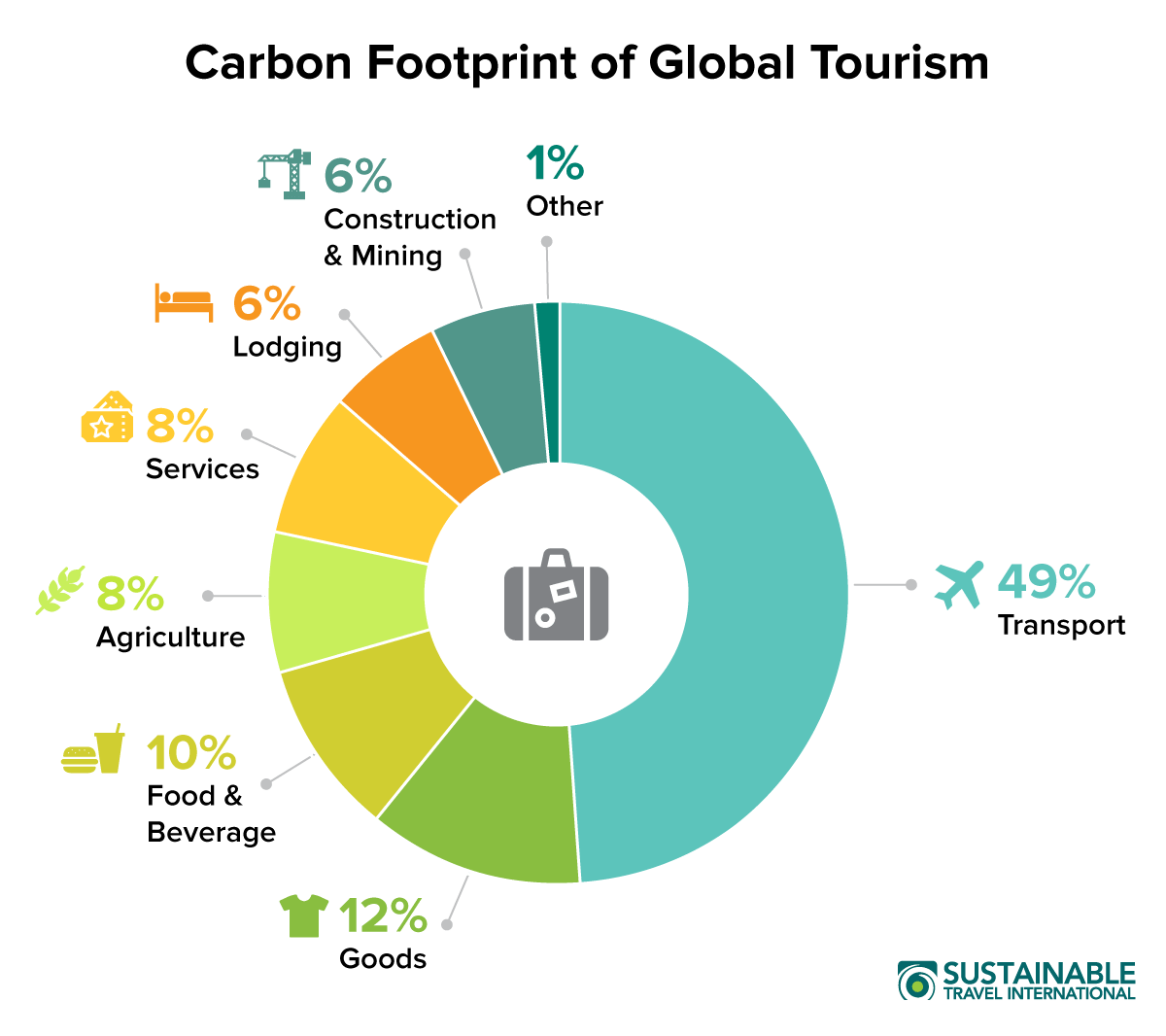
This graph shows the different activities that contribute to tourism’s total carbon footprint.
Data Source: Nature Climate Change (2018)
Getting from here to there is the most basic component of tourism. Planes, cars, trains, boats, and even hot air balloons allow us to explore destinations all around the world. However, all of our jet-setting and road-tripping comes with a hefty carbon footprint.
Today, transportation is tourism’s main source of greenhouse gas emissions. On average, planes and cars generate the most CO2 per passenger mile, with tour buses, ferries, and trains coming well behind. In recent years, the number of people traveling internationally skyrocketed as airfare became more affordable. Similarly, between 2005 and 2016, transport-related tourism emissions increased by more than 60% .
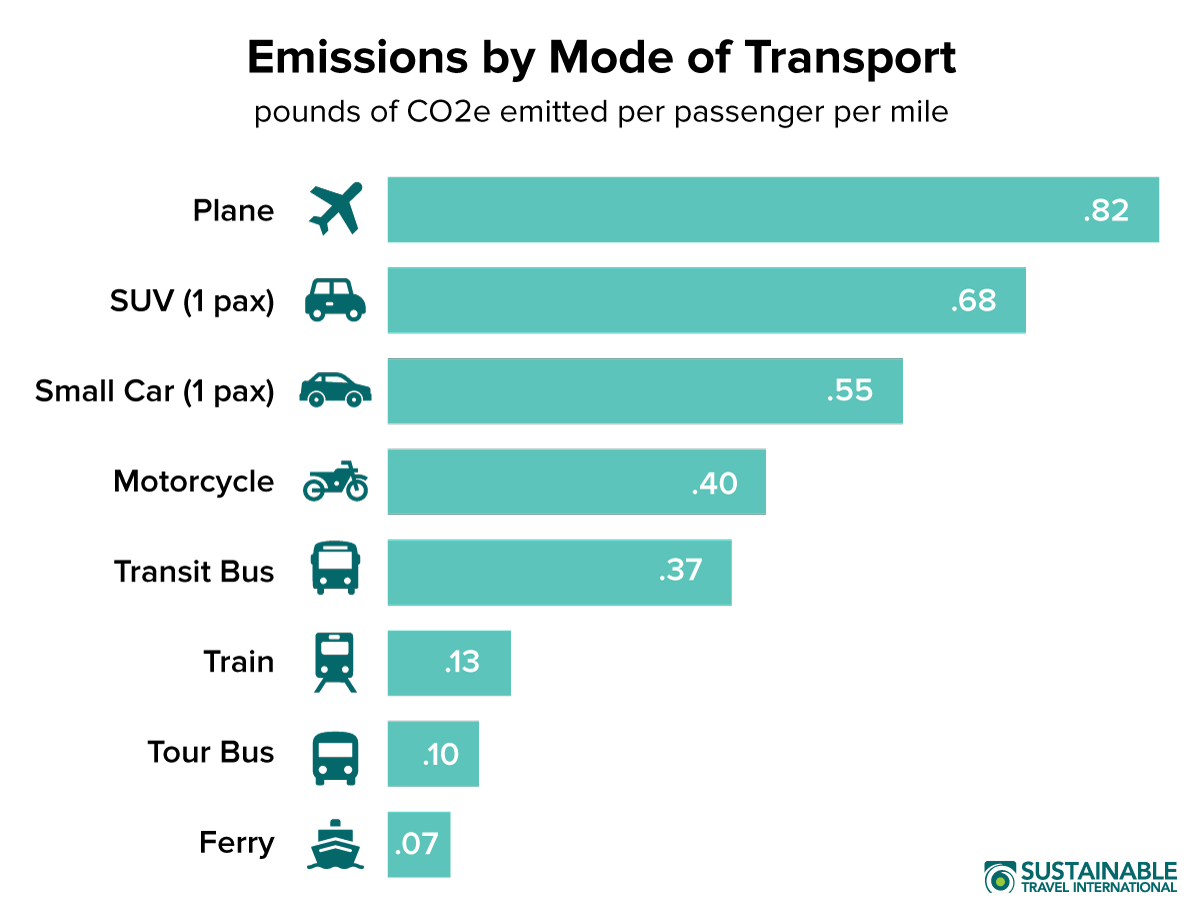
These are averages based on 2020 UK conversion factors. Values will vary based on distance traveled, vehicle model, occupancy rate, flight class, and various other factors.
It would take an acre of forest a year to absorb the same amount of CO2 emissions of a one-way flight from London to New York. That’s about the same amount of emissions that the average person in Zimbabwe generates over an entire year.
In the same way your house generates emissions from energy use, so do the hotels, homestays, and rental homes that you stay in while on vacation. Many accommodations rely on heating and air conditioning to keep guest rooms at a pleasant temperature in hot or cold climates. These energy-intensive systems create CO2, as do the water heaters used to warm showers, pools, and spas. Electricity used to power lights, TVs, refrigerators, laundry machines, and other equipment is also a big contributor, especially in areas with dated or inefficient systems.
Emissions from lodging tend to be highest in resorts and hotels that offer modern services, while smaller lodgings such as homestays and guest houses have lower emissions for the most part.

Data Source: Caribbean Hotel Energy Efficiency Action Program (2012)
While hotels can lessen their footprint by utilizing clean energy sources, most still depend on dirty fossil fuels for the majority of their energy. According to the 2018 Green Lodging Trends Report , only 21% of hotels currently have on-site renewable energy.
Construction
Resorts, airports, and other tourism facilities can produce massive amounts of carbon even before they open their doors to tourists. Constructing a new building is an energy-intensive process – manufacturing the materials, transporting everything to the site, and constructing the building all generate carbon emissions. And it’s not just buildings that leave behind a footprint – the development of roads and other infrastructure for tourism also contributes to climate change.
Destruction of Carbon Sinks
Along with the construction process, tourism development emits carbon through the clearing of natural areas. Ecosystems, such as forests, act as carbon sinks by absorbing and storing emissions. When this carbon-rich vegetation is removed, CO2 is released back into the atmosphere.
The mangrove forests that grow along coastlines in many tropical destinations have a tremendous capacity to store carbon. Studies show that they can store up to 4 times more carbon than most other tropical forests around the world. Sadly, vast areas of mangroves are often cleared to make way for tourist infrastructure such as seaside resorts, beaches, marinas, and entertainment areas.
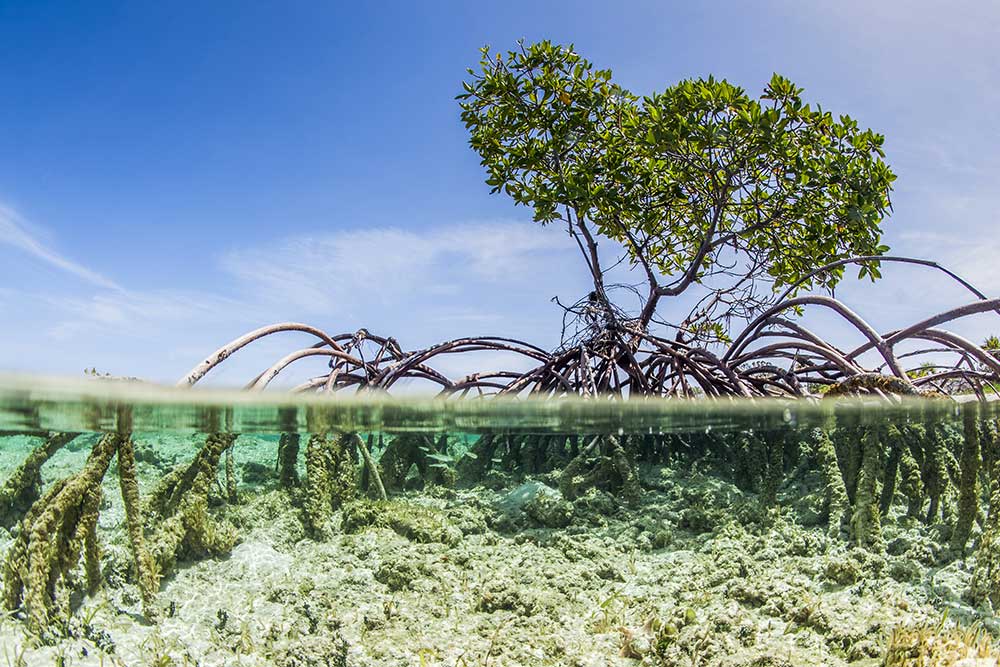
The world lost a football field-sized area of tropical forest every five seconds in 2019, causing the same amount of carbon emissions that 400 million cars would produce over an entire year
Food & Drink
Food production is responsible for roughly one-quarter of the world’s greenhouse gas emissions. Getting food from farm to table means growing, processing, transporting, packaging, refrigerating, and cooking – all of which require energy and contribute to your meal’s carbon footprint. Travel often multiplies this footprint since people tend to indulge more while on vacation.
To cater to visitor tastes, many hotels and restaurants import the majority of their food products from other countries. Remote island destinations are especially dependent on imports. It is estimated that up to 80% of the food consumed by the tourism industry in Pacific islands is brought in from overseas. The farther food travels, the more emissions are generated – and to get food to these secluded islands, it has to travel a very long way
Thanks to all-you-can eat hotel buffets and oversized restaurant portions, a substantial amount of the food produced for tourism ends up getting thrown away. When food is wasted, this means that all of those emissions that were generated by its production were unnecessary. Globally, less than half of hotels compost their food waste. When this food decomposes in landfills it creates methane which is 21 times more potent than carbon dioxide.
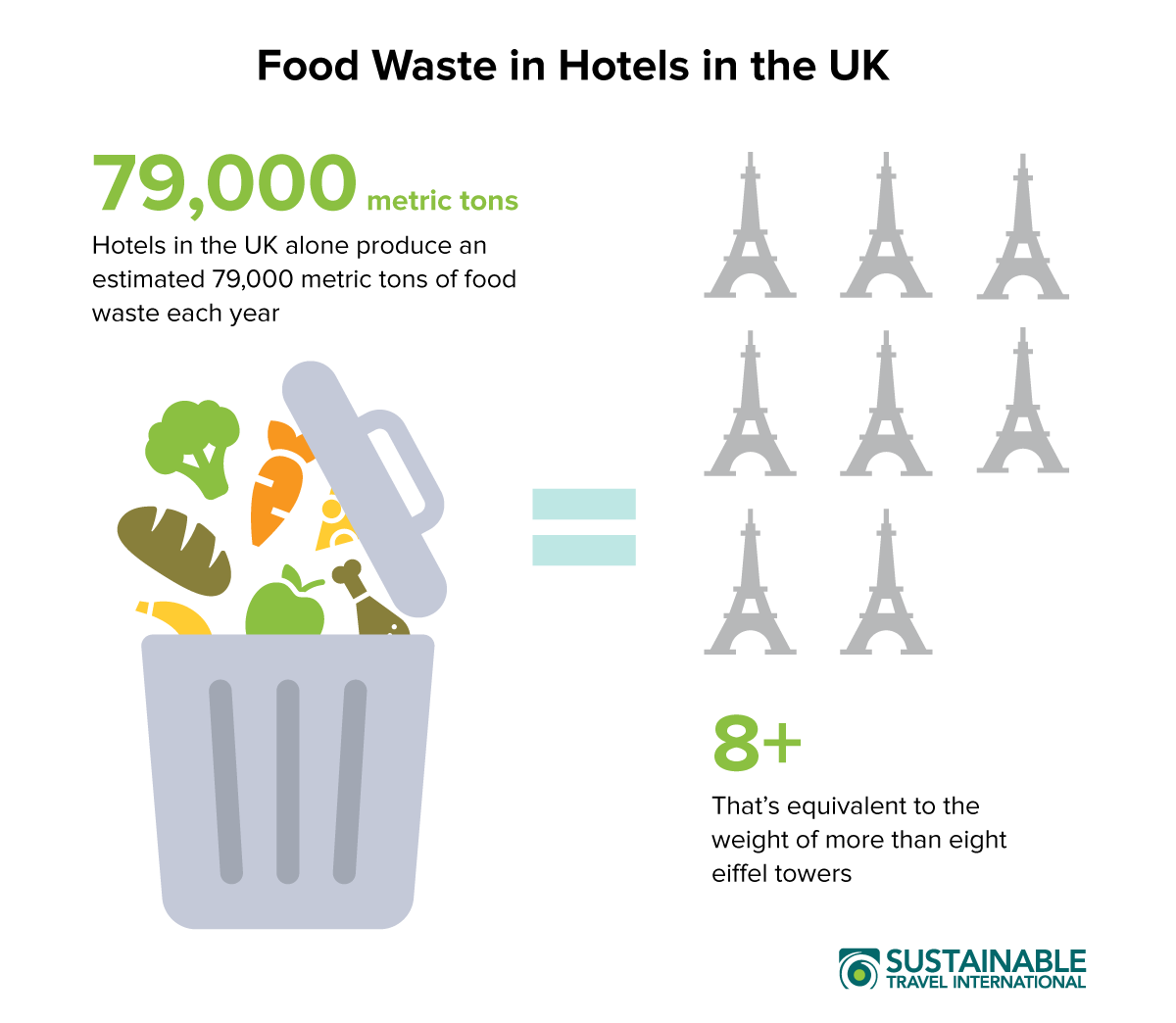
Data Source: Waste & Resources Action Programme
Wastage of food in tourism is part of a larger, global issue. In fact, if food waste were a country, it would be the world’s 3rd largest emitter of CO2.
Though every trip must eventually come to an end, tourists are sure to return home with magnets, hats, art pieces, and other trinkets to remind them of their vacation. But traveler purchases aren’t limited to kitschy souvenirs. From street markets to high-end boutiques, shopping is now a travel experience in itself.
Whether its jewelry or electronics, the carbon footprint of an item must be calculated with production, manufacturing and shipping in mind. There’s something special about purchasing an item that was made locally in the destination, yet oftentimes souvenirs and other products are mass-produced in factories far away. An item may have travelled between a number of countries and continents before reaching its final destination. For example, the cotton used to make a t-shirt sold in New York may have originated from China, been shipped to Vietnam for manufacturing then flown to New York for sale. Travelers’ buying habits are often different from locals’, thus increasing production emissions.

Looking Ahead
With the impacts of climate change becoming increasingly evident, it is critical that local governments, tourism businesses and suppliers, along with individual travelers all take action to reduce the industry’s reliance on fossil fuels.
New technologies such as solar-powered water heaters, temperature control systems, and energy saving appliances allow the industry to lessen its carbon footprint. Yet these innovations are not enough to outweigh the emissions created by a growing number of travelers. Projections indicate that tourism emissions could reach 6.5 billion metric tons by 2025. This represents a 44% increase from 2013, and is equivalent to about 13% of current global greenhouse gas emissions. For those emissions that aren’t yet avoidable, carbon offsetting should be used to complement sustainability practices and reduce tourism’s carbon footprint.
What You Can Do

Use our online calculator to determine the amount of emissions generated by your travels
Lessen the carbon footprint of your next trip by adopting these sustainable travel practices

Your carbon footprint by supporting forestry or energy projects that reduce CO2 and benefit communities
Stay Connected
Join our mailing list to receive email updates about our work and learn how you can make a difference!
Newsletter Signup
- Enter your email address
- Comments This field is for validation purposes and should be left unchanged.
- © 2024 | Sustainable Travel International
- Privacy Policy
Download Our Sustainable Travel Tips List
Subscribe to get your free tips list, plus sustainable travel emails and content
Check your inbox for our Sustainable Travel Tips.
Travel, Tourism & Hospitality

Sustainable tourism worldwide - statistics & facts
What are the effects of global tourism on the climate, traveler awareness of social and environmental responsibility, key insights.
Detailed statistics
Ecotourism market size worldwide 2022-2028
Tourism-related transport's share of carbon emissions worldwide 2016-2030
Global travelers who believe in the importance of green travel 2023
Editor’s Picks Current statistics on this topic
Leisure Travel
Global carbon dioxide emissions from energy 1965-2022, by region
Further recommended statistics
Industry overview.
- Premium Statistic Ecotourism market size worldwide 2022-2028
- Premium Statistic Global travelers who believe in the importance of green travel 2023
- Premium Statistic Sustainable initiatives travelers would adopt worldwide 2022, by region
- Premium Statistic Conscious travelers' challenges when traveling in a sustainable manner worldwide 2022
Market size of the ecotourism sector worldwide in 2022, with a forecast for 2028 (in billion U.S. dollars)
Share of travelers that believe sustainable travel is important worldwide in 2023
Sustainable initiatives travelers would adopt worldwide 2022, by region
Main sustainable initiatives travelers are willing to adopt worldwide in 2022, by region
Conscious travelers' challenges when traveling in a sustainable manner worldwide 2022
Challenges of travelers when trying to travel in a sustainable and socially conscious manner worldwide as of March 2022
Environmental impact
- Basic Statistic Global carbon dioxide emissions from energy 1965-2022, by region
- Premium Statistic Tourism-related transport's share of carbon emissions worldwide 2016-2030
- Premium Statistic Carbon footprint of tourism-related transport worldwide 2005-2030
- Premium Statistic Carbon footprint of international tourism transport worldwide 2005-2030, by type
- Premium Statistic Carbon footprint of domestic tourism transport worldwide 2005-2030, by type
Carbon dioxide emissions from energy worldwide from 1965 to 2022, by region (in million metric tons of carbon dioxide)
Tourism-related transport's share of carbon emissions worldwide 2016-2030
Share of carbon dioxide emissions coming from tourism-related transport worldwide in 2016, with a forecast for 2030
Carbon footprint of tourism-related transport worldwide 2005-2030
Carbon dioxide emissions from tourism-related transport worldwide in 2005 and 2016, with a forecast for 2030 (in million metric tons of carbon dioxide)
Carbon footprint of international tourism transport worldwide 2005-2030, by type
Transport-related emissions from international tourist arrivals worldwide in 2005 and 2016, with a forecast for 2030, by mode of transport (in million metric tons of carbon dioxide)
Carbon footprint of domestic tourism transport worldwide 2005-2030, by type
Transport-related emissions from domestic tourist arrivals worldwide in 2005 and 2016, with a forecast for 2030 (in million metric tons of carbon dioxide), by mode of transport
International tourism figures
- Premium Statistic Number of international tourist arrivals worldwide 1950-2023
- Basic Statistic Number of international tourist arrivals worldwide 2005-2023, by region
- Premium Statistic Countries with the highest number of inbound tourist arrivals worldwide 2019-2023
- Premium Statistic Global air traffic - number of flights 2004-2024
- Premium Statistic Global air traffic - scheduled passengers 2004-2022
Number of international tourist arrivals worldwide 1950-2023
Number of international tourist arrivals worldwide from 1950 to 2023 (in millions)
Number of international tourist arrivals worldwide 2005-2023, by region
Number of international tourist arrivals worldwide from 2005 to 2023, by region (in millions)
Countries with the highest number of inbound tourist arrivals worldwide 2019-2023
Countries with the highest number of international tourist arrivals worldwide from 2019 to 2023 (in millions)
Global air traffic - number of flights 2004-2024
Number of flights performed by the global airline industry from 2004 to 2023, with a forecasts for 2024 (in millions)
Global air traffic - scheduled passengers 2004-2022
Number of scheduled passengers boarded by the global airline industry from 2004 to 2022 (in millions)
Opinions and behavior
- Premium Statistic Main drivers for visiting a country by people worldwide 2023
- Premium Statistic Share of outbound travelers planning to spend more worldwide 2022, by category
- Premium Statistic Share of global travelers that want to use green lodging in the next year 2016-2022
- Premium Statistic Interest in accommodation with high sustainability standard globally 2023, by country
- Premium Statistic Reasons global travelers stayed in sustainable lodging at least once last year 2022
- Premium Statistic Demand for sustainable hotels by global corporate travel managers 2022
Main drivers for visiting a country by people worldwide 2023
Reasons to visit a country according to respondents worldwide in 2023
Share of outbound travelers planning to spend more worldwide 2022, by category
Share of travelers planning to spend more on trips abroad in selected countries worldwide in 2022, by type of expenditure
Share of global travelers that want to use green lodging in the next year 2016-2022
Distribution of global travelers intending to stay at least once in an eco-friendly or green accommodation when looking at the year ahead from 2016 to 2022
Interest in accommodation with high sustainability standard globally 2023, by country
Share of travelers who look for accommodation with impressive sustainability innovation worldwide as of July 2023, by country
Reasons global travelers stayed in sustainable lodging at least once last year 2022
Main reasons travelers stayed in sustainable accommodation at least once over the past year worldwide in as of February 2022
Demand for sustainable hotels by global corporate travel managers 2022
Importance of hotel sustainability for business travel buyers worldwide as of October 2022
Further reports
Get the best reports to understand your industry.
Mon - Fri, 9am - 6pm (EST)
Mon - Fri, 9am - 5pm (SGT)
Mon - Fri, 10:00am - 6:00pm (JST)
Mon - Fri, 9:30am - 5pm (GMT)

- The Responsible Tourism System
THE RESPONSIBLE TOURISM SYSTEM AND BIOSPHERE
The Responsible Tourism System (RTS) is an international system focused on seeking tourism sustainability, developed by the Responsible Tourism Institute through a set of guidelines that establish concrete, identifiable and measurable goals.
The Responsible Tourism Institute (RTI) is an entity linked to UNESCO through a Memorandum of Understanding and an associated member of the World Tourism Organization ( UNWTO ), as well as being a founding member of the Global Sustainable Tourism Council ( GSTC ), an organization sponsored by the United Nations Foundation. It was conceived at the request of the UN following the first World Conference on Sustainable Tourism (1995) , an historic meeting in which UNESCO, UNEP, the European Commission and UNWTO supported the creation of the World Charter on Sustainable Tourism from which the Responsible Tourism Institute was born.

Twenty years later, following the UN World Summit on Sustainable Development (2015), which adopted the 17 Sustainable Development Goals (SDG) , the RTI promoted the celebration of a new World Summit on Sustainable Tourism, which again had the support of the same international organizations for the adaptation of global sustainability criteria to the 17 Sustainable Development Goals, this time adopting the World Charter on Sustainable Tourism +20.
The Responsible Tourism Institute is responsible of promoting tourist models that contribute effectively to the maintenance and protection of heritage, cultural and natural assets of the destinations. Its ultimate goal is to promote sustainable development within the tourism industry and encourage the use of the endogenous capacities of each destination and host community. The recognition of these efforts by the Administrations and entities involved consists of the BIOSPHERE TOURISM© seal, through which the work carried out is acknowledged.
The BIOSPHERE TOURISM© Seal is a system for measuring sustainability, aiming to act as a tool for continuous improvement and thus recognize this commitment of tourist destinations, companies and services. Positioning a destination, company or tourist service as sustainable requires the adoption of an integrated planning and management perspective of the entire tourism system, so that current and future needs are met, while maintaining cultural integrity, social cohesion and essential ecological processes. The BIOSPHERE TOURISM© standard for Tourist Destinations is the only one in the world aligned with the United Nations Sustainable Development Goals (SDG), as well as with the COP21 Paris Agreement to Combat Climate Change and the World Charter Sustainable Tourism +20.

I want to know more
ARE PART OF THE RTS

Ethics in Tourism: Responsibility Toward Balancing Sustainability
- Living reference work entry
- First Online: 22 November 2023
- Cite this living reference work entry

- Anukrati Sharma 2 &
- Priya Sodani 3
Part of the book series: Springer International Handbooks of Education ((SIHE))
60 Accesses
1 Citations
The tourism industry is one of the largest industries in the world. It is an integral aspect of global economies, cultures, and societies, providing opportunities for economic growth and cross-cultural understanding. However, the rapid expansion of tourism brings major benefits to destinations, but can also be damaging to the people living there and to their environment, which has raised significant ethical concerns that demand careful attention. This research paper explores the multifaceted dimensions of ethics in tourism, examining the impact of tourism on local communities, the environment, and cultural heritage. It further discusses the responsibilities of stakeholders in promoting sustainable tourism practices that prioritize social, economic, and environmental well-being to address ethical solutions in tourism industry. By addressing these ethical challenges, the tourism industry can foster positive impacts and ensure the long-term sustainability of destinations worldwide.
This is a preview of subscription content, log in via an institution to check access.
Access this chapter
Institutional subscriptions
Books/Articles
Buckley, R. (2021). Sustainable tourism: Research and reality . Oxford University Press.
Google Scholar
Cohen, E. (2002). Authenticity and commoditization in tourism. Annals of Tourism Research, 15 , 271–386.
Holden, A. (2013). Environment and tourism . Routledge. ISSN 0-415-20718-5.
Jamal, T. (2020). Tourism ethics: A perspective article. Tourism Review, 75 (1), 221–224, Emerald Publishing, ISSN: 1660-5373.
Kozak, M., & Baloglu, S. (2011). Managing and marketing tourist destinations: Strategies to gain a competitive edge . ISBN 9780415811484.
Liu, C. H., Tzeng, G. H., Lee, M. H., & Lee, P. Y. (2013). Improving metro–airport connection service for tourism development: Using hybrid MCDM models. Tourism Management Perspectives, 6 , 95–107. https://doi.org/10.1016/j.tmp.2012.09.004
Article Google Scholar
Oskam, J. A., & De Visser-Amundson, A. (2022). A systematic review of ethical issues in hospitality and tourism innovation. Journal of Hospitality and Tourism Insights , ISSN: 2514-9792.
Sharma, V. (2019). An empirical study on dynamism between ethics and tourism. International Journal of Economic Research, 16 (1) ISSN 0972-9380.
Weaver, D. (2006). Sustainable tourism: Theory and practice . Butterworth-Heinemann.
Zebardast, L. (2018). The role of environmental ethics in sustainable development. International Journal of Ethics & Society (IJES), 1 .
Reports and Online Sources
European Travel Commission (ETC). (2017). European Tourism manifesto for growth and jobs .
Global Sustainable Tourism Council (GSTC).
International Tourism Partnership (ITP). (2017). Hotel global decarbonisation report .
United Nations World Tourism Organization (UNWTO). EU guidebook on sustainable tourism for development, 27th of June 2013 in Brussels .
World Travel & Tourism Council (WTTC). (2021). Travel & tourism: A global economic impact 2021 .
Download references
Author information
Authors and affiliations.
Head and Associate Professor, Department of Commerce and Management, University of Kota, Rajasthan, Kota, India
Anukrati Sharma
Assisstant Professor, Department of Commerce and Management, Modi Institute of Management and Technology, Rajasthan, Kota, India
Priya Sodani
You can also search for this author in PubMed Google Scholar
Editor information
Editors and affiliations.
Dept. of Commerce and Management, University of Kota, Kota, Rajasthan, India
Rights and permissions
Reprints and permissions
Copyright information
© 2024 Springer Nature Singapore Pte Ltd.
About this entry
Cite this entry.
Sharma, A., Sodani, P. (2024). Ethics in Tourism: Responsibility Toward Balancing Sustainability. In: Sharma, A. (eds) International Handbook of Skill, Education, Learning, and Research Development in Tourism and Hospitality. Springer International Handbooks of Education. Springer, Singapore. https://doi.org/10.1007/978-981-99-3895-7_41-1
Download citation
DOI : https://doi.org/10.1007/978-981-99-3895-7_41-1
Received : 29 July 2023
Accepted : 12 October 2023
Published : 22 November 2023
Publisher Name : Springer, Singapore
Print ISBN : 978-981-99-3895-7
Online ISBN : 978-981-99-3895-7
eBook Packages : Springer Reference Education Reference Module Humanities and Social Sciences Reference Module Education
- Publish with us
Policies and ethics
- Find a journal
- Track your research
- Search Please fill out this field.
- Manage Your Subscription
- Give a Gift Subscription
- Newsletters
- Sweepstakes
- Travel Tips
- Responsible Travel
- Global Vision Awards
These Travel Companies Are Setting a New Standard in Responsible Tourism: Global Vision Awards 2022
The Global Vision Awards honorees in this category demonstrate a clear vision for how the travel and hospitality industry can become more sustainable and benefit underrepresented or underemployed communities around the world.
Jeff Chu is an editor-at-large at Travel + Leisure .
:max_bytes(150000):strip_icc():format(webp)/Jeff-Chu-1-5ba972816d394d56b45b227b5e41b423.jpg)
Heidi Mitchell is a writer and editor with more than 25 years of experience covering consumer trends, travel, design, and more. She is a former editor at Travel + Leisure , Town & Country , and Rolling Stone .
:max_bytes(150000):strip_icc():format(webp)/Heidi-Mitchell-2d58d7758195494d90634045dfc4cfab.jpg)
The Travel + Leisure Global Vision Awards aim to identify and honor companies, individuals, destinations, and organizations taking strides to develop more sustainable and responsible travel products, practices, and experiences. Not only are they demonstrating thought leadership and creative problem-solving, they are taking actionable, quantifiable steps to protect communities and environments around the world. What's more, they are inspiring their industry colleagues and travelers to do their part.
In choosing the honorees in our annual Global Vision Awards , the first thing we look for is real, tangible impact. The five companies in this category are thinking both broadly and deeply about concrete ways that travel can spur long-term, positive change. Whether they're in the business of planning enriching itineraries led by the communities where people are traveling, innovating in the aircraft industry, or finding ways for tourism to lift up marginalized communities, these honorees are dedicated to turning their ideas into actionable projects that will improve travel — and the world — for generations to come. — T+L Editors
Alaskan Dream Cruises
Plenty of cruise companies offer expeditions through Alaska's majestic Inner Passage, Glacier Bay, and frontier lands, but only Alaskan Dream Cruises is owned and operated by Native Alaskans. The Allen family, whose lineage is Tlingit, has been welcoming curious cruisers for more than 50 years. The company's six vessels, which range from five to 38 cabins, are staffed by Alaskan naturalist guides who dispense the sort of personal insights that only locals can. Ports of call are often Indigenous villages such as Kasaan, where guests visit the last Haida longhouse in the United States. The onboard experience also highlights the state's riches: bath amenities are Alaska-made; bed scarves were designed by local artists; cocktails are prepared with glacial ice; and local seafood highlights every menu. Guests can spot whales, otters, bears, sea lions, deer, and eagles regularly, while the sounds from the fathoms below burble to the surface thanks to a shipboard hydrophone. The company's newest ship, the six-stateroom Kruzof Explorer , takes passengers to communities where larger ships can't dock, landing at under-the-radar destinations includingLituya Bay, Dall Island, and Baranof Warm Springs. — Heidi Mitchell
Black Cultural Heritage Tours
Despite infusing $109.4 billion into the leisure travel industry, Black Americans have been sidelined from mainstream travel experiences — their companies omitted from itineraries, their histories left untold. But Stephanie M. Jones, founder of the National Blacks in Travel and Tourism Collective, is changing that. In 2016, her group debuted the Cultural Heritage Alliance for Tourism, Inc. (CHAT), "to level the playing field for micro local Black and Brown businesses within underrepresented neighborhoods," she says. This year, she launched Black Cultural Heritage Tours , which aims to drive tourists' foot traffic and revenue to underrepresented businesses so they can become sustainable and scalable. From September onward, travelers can book itineraries of the Southeastern U.S. that may include jaunts through the Gullah Geechee Corridor, deep dives into the Civil Rights Movement, an in-depth exploration of the Underground Railroad. No matter the route, all tours include church visits, culinary adventures, and contemporary culture excursions. "Our approach to our itineraries is to provide transformative experiences for culturally curious travelers who seek a broader understanding of the Black experience and culture in the U.S.," explains Jones. "We want travelers to become intentional about depositing into local communities as much as they take away." — H.M.
As Blake Scholl sees it, travel has been a net good for the world: "Since the dawn of the jet age," he says, "people have been able to spend more time with other people in other cultures." But as he pondered a world in which everything — from computers to phones to cars — was getting significantly more efficient and environmentally friendly, the lifelong airplane geek wondered why the same wasn't happening for aircraft. Scholl made it his goal to help air travel become "faster, more affordable, and dramatically more sustainable than it is today." By 2029, his Denver-based company, Boom , plans to put into service the 65-seat Overture, the first supersonic commercial aircraft since the Concorde. The Overture will minimize noise and run entirely on sustainable aviation fuel. And from the start, acknowledging that no machine lasts forever, the team has designed with both airborne efficiency and possibilities for recycling in mind. United Airlines has already ordered 15 Boom Overture jets, which will whisk passengers from New York to London in less than three-and-a-half hours. "We want to make the airplane you most want to be on — with speed, comfort, and convenience," Scholl says, "and also the best one for the planet." — Jeff Chu
Kerala Responsible Tourism Mission
Five years ago, the government of the south Indian state of Kerala unveiled a groundbreaking new agency. Its charge: to use tourism as a platform to eradicate poverty, empower women, and safeguard the environment. Its philosophy? "Making better places for people to live in and better places for people to visit." Since then, the Responsible Tourism Mission has carefully mapped the state, identifying communities with rich but overlooked cultural expertise. A new database connects artists and performers with players in the tourism industry. Farmers are trained to host visitors on their land. And new itineraries highlight (and produce new income streams for) artisans. These include visits to ceramicists in the hamlet of Nellarachal and metalworkers in Kunhimangalam — a town long known for its handcrafted bells and Hindu idols. RT Mission also has environmental initiatives — cleaning waterways, for example, or implementing more efficient waste-management practices — in nearly two dozen communities, from the Arabian Sea village of Mararikulam in the west to Thekkady, on Kerala's eastern border, which abuts a sanctuary for elephants and Bengal tigers.— J.C.
Saira Hospitality
Harsha L'Acqua has always been passionate about the hospitality business. While working at luxury hotel brands such as Six Senses and the Standard, she became discouraged by the unsustainable turnover rate of employees at most properties (almost 50 percent). In 2016, she decided to launch her own nonprofit to help remedy the problem. Saira Hospitality develops bespoke pop-up hospitality schools that partner with hotel brands launching new properties to train underserved and disadvantaged individuals from the surrounding community. Not only does the approach create more jobs and better prospects for long-term growth in communities, it also fosters a more enriching experience for hotel guests who reap the benefits of interacting with the people most knowledgeable about a given area. Saira has seen its model work around the world in countries including Namibia (Habitas), Mexico (Hotel San Cristóbal in Todos Santos), and the British Virgin Islands (Rosewood, Virgin Limited Edition, Autograph Collection, and Bitter End). This year, Chanrai is opening up a permanent Saira location in London, a city that, like many others, is suffering from a lack of hospitality employees due to the pandemic. — Gisela Williams
Related Articles
The state of tourism and hospitality 2024
Tourism and hospitality are on a journey of disruption. Shifting source markets and destinations, growing demand for experiential and luxury travel, and innovative business strategies are all combining to dramatically alter the industry landscape. Given this momentous change, it’s important for stakeholders to consider and strategize on four major themes:
- The bulk of travel is close to home. Although international travel might draw headlines, stakeholders shouldn’t neglect the big opportunities in their backyards. Domestic travel still represents the bulk of travel spending, and intraregional tourism is on the rise.
- Consumers increasingly prioritize travel—when it’s on their own terms. Interest in travel is booming, but travelers are no longer content with a one-size-fits-all experience. Individual personalization might not always be practical, but savvy industry players can use segmentation and hypothesis-driven testing to improve their value propositions. Those that fail to articulate target customer segments and adapt their offerings accordingly risk getting left behind.
- The face of luxury travel is changing. Demand for luxury tourism and hospitality is expected to grow faster than any other travel segment today—particularly in Asia. It’s crucial to understand that luxury travelers don’t make up a monolith. Segmenting by age, nationality, and net worth can reveal varied and evolving preferences and behaviors.
- As tourism grows, destinations will need to prepare to mitigate overcrowding. Destinations need to be ready to handle the large tourist flows of tomorrow. Now is the time for stakeholders to plan, develop, and invest in mitigation strategies. Equipped with accurate assessments of carrying capacities and enhanced abilities to gather and analyze data, destinations can improve their transportation and infrastructure, build tourism-ready workforces, and preserve their natural and cultural heritages.

McKinsey Live event: Faces, places, and trends: The state of tourism & hospitality
Thursday, June 13 at 10:30 a.m EDT / 4:30 p.m CET
Now boarding: Faces, places, and trends shaping tourism in 2024
Global travel is back and buzzing. The amount of travel fell by 75 percent in 2020; however, travel is on its way to a full recovery by the end of 2024. More regional trips, an emerging population of new travelers, and a fresh set of destinations are powering steady spending in tourism.
There’s no doubt that people still love to travel and will continue to seek new experiences in new places. But where will travelers come from, and where will they go?
We share a snapshot of current traveler flows, along with estimates for growth through 2030.
The way we travel now
Which trends are shaping traveler sentiment now? What sorts of journeys do today’s travelers dream about? How much are they willing to spend on their trips? And what should industry stakeholders do to adapt to the traveler psychology of the moment?
To gauge what’s on the minds of present-day travelers, we surveyed more than 5,000 of them. The findings reveal disparate desires, generational divides, and a newly emerging set of traveler archetypes.
Updating perceptions about today’s luxury traveler
Demand for luxury tourism and hospitality is expected to grow faster than for any other segment. This growth is being powered in part by a large and expanding base of aspiring luxury travelers with net worths between $100,000 and $1 million, many of whom are younger and increasingly willing to spend larger shares of their wealth on upscale travel options. The increase is also a result of rising wealth levels in Asia.
We dug deeper into this ongoing evolution by surveying luxury travelers around the globe about their preferences, plans, and expectations. Some widely held notions about luxury travelers—such as how much money they have, how old they are, and where they come from—could be due for reexamination.
Destination readiness: Preparing for the tourist flows of tomorrow
As global tourism grows, it will be crucial for destinations to be ready. How can the tourism ecosystem prepare to host unprecedented volumes of visitors while managing the challenges that can accompany this success? A large flow of tourists, if not carefully channeled, can encumber infrastructure, harm natural and cultural attractions, and frustrate locals and visitors alike.
Now is the time for tourism stakeholders to combine their thinking and resources to look for better ways to handle the visitor flows of today while properly preparing themselves for the visitor flows of tomorrow. We offer a diagnostic that destinations can use to spot early-warning signs about tourism concentration, along with suggestions for funding mechanisms and strategies to help maximize the benefits of tourism while minimizing its negative impacts.
Six trends shaping new business models in tourism and hospitality
As destinations and source markets have transformed over the past decade, tourism and hospitality companies have evolved, too. Accommodation, home sharing, cruises, and theme parks are among the sectors in which new approaches could present new opportunities. Stakeholders gearing up for new challenges should look for business model innovations that will help sustain their hard-won growth—and profits.
Unbundling offerings, cross-selling distinctive experiences, and embracing data-powered strategies can all be winning moves. A series of insight-driven charts reveal significant trends and an outlook on the future.
RELATED ARTICLES

The future of tourism: Bridging the labor gap, enhancing customer experience

The promise of travel in the age of AI

From India to the world: Unleashing the potential of India’s tourists
Language selection
- Français fr
Government of Canada to announce support for the tourism sector in the Niagara region
From: Federal Economic Development Agency for Southern Ontario
Media advisory
The Honourable Soraya Martinez Ferrada, Minister of Tourism, on behalf of the Honourable Filomena Tassi, Minister responsible for the Federal Economic Development Agency for Southern Ontario (FedDev Ontario), will make an important announcement for tourism businesses and organizations in the Niagara region.
May 30, 2024 – Niagara-on-the-Lake, Ontario
The Honourable Soraya Martinez Ferrada, Minister of Tourism, on behalf of the Honourable Filomena Tassi, Minister responsible for the Federal Economic Development Agency for Southern Ontario (FedDev Ontario), will make an important announcement for tourism businesses and organizations in the Niagara region. Minister Ferrada will be joined by Vance Badawey, Parliamentary Secretary to the Minister of Transport and Member of Parliament for Niagara Centre and Chris Bittle, Parliamentary Secretary to the Minister of Housing, Infrastructure and Communities and Member of Parliament for St. Catharines.
A media availability will follow the in-person announcement.
Please note that details are subject to change. All times are local.
Date: Friday, May 31, 2024
Time: 3:30 p.m.
Location: Byland Estate Winery 834 Line 3 Road, Niagara-on-the-Lake, Ontario L0S1J0
R.S.V.P: Please submit your request to [email protected] .
Edward Hutchinson Press Secretary Office of the Minister responsible for the Federal Economic Development Agency for Southern Ontario [email protected]
FedDev Ontario Media Relations [email protected]
Stay connected
FedDev-Ontario.Canada.ca
Follow @FedDevOntario on social media : Twitter , Instagram , LinkedIn , Facebook .
Subscribe to FedDev Ontario's Southern Ontario Spotlight newsletter , featuring economic development news and updates from across the region.
Page details

Corruption watchdog called in to investigate Tourism Australia travel expenses scandal
T he National Anti-Corruption Commission has been asked to investigate revelations three Tourism Australia staff charged taxpayers $137,441 for personal travel expenses.
The staff have since been sacked from the agency, which is responsible for promoting Australia's tourism industry abroad.
Appearing before a Senate committee in Canberra, Tourism Australia chief executive Phillipa Harrison said the spending had been uncovered in October 2023 when the agency's own staff detected the misuse of funds.
The incident was referred to the National Anti-Corruption Commission (NACC) for further investigation on January 21 this year.
"The three employees undertook personal travel that was booked through Tourism Australia's corporate travel agent, and was invoiced to Tourism Australia," she told the committee.
"Tourism Australia demanded that the three individuals repay the full amount of the travel, and that full amount was $137,441, and that was fully repaid to Tourism Australia in December 2023."
Ms Harrison was reluctant to go in to further detail about the incident, saying Tourism Australia was awaiting a response from the NACC about the situation.
New South Wales Nationals senator Ross Cadell wanted more information about who the sacked staff were, and used his questions in the committee to ask whether the agency's chief financial officer was among those involved.
"The NACC has advised me that I'm unable to provide the further details on the roles and the people involved, until they have finished their investigations," Ms Harrison responded.
"To do so may compromise current or potential investigations, and prematurely impact the reputations of individuals in circumstances.
"The legislation enacted by parliament intends to avoid that by requiring that investigations, generally, be conducted in private and that information concerning them is not to be disclosed."
No details provided on destinations of travel, yet
Ms Harrison did commit to providing Senator Cadell with details on how many trips were booked by the staff, and the destinations for the travel.
"I am shooketh by not being able to ask these questions," Senator Cadell quipped.
The committee hearing was briefly suspended, to allow senators to discuss the concerns about Tourism Australia staff not answering questions.
Tourism and Trade Minister Don Farrell said Ms Harrison would make a public interest immunity claim, to outline the situation.
"I have to say, this is the first time in my experience where a direction from the NACC has directed an official not to make a public statement," he said.
"This does present some significant issues, which I myself would like to get clarified.
"You and I both voted for this legislation, and obviously this is how it's being applied – the witness, obviously, has to comply with the direction of the NACC, she has no choice."
Ms Harrison said Senator Farrell's office had been made aware of the situation in late 2023.
The matter has not been referred to authorities.

UN Tourism | Bringing the world closer
Share this content.
- Share this article on facebook
- Share this article on twitter
- Share this article on linkedin
- Tourism and the Sustainable Development Goals – Journey to 2030
- All Regions
- ISBN 978-92-844-1940-1
- N PAG. 978-92-844-1940-1
A joint effort by UNWTO, UNDP and other partners, Tourism and the Sustainable Development Goals – Journey to 2030 aims to build knowledge, and empower and inspire tourism stakeholders to take necessary action to accelerate the shift towards a more sustainable tourism sector by aligning policies, business operations and investments with the SDGs. The publication intends to disentangle the links between tourism and the SDGs and provides recommendations on how to steer the road towards 2030, based on an analysis of 64 countries’ Voluntary National Reviews (VNRs) on the SDGs – submitted to the United Nations High-level Political Forum on Sustainable Development in 2016 and 2017 –, as well as eight Mainstreaming, Acceleration and Policy Support (MAPS) country roadmaps and corporate social responsibility (CSR) activities of 60 global tourism companies.
Related Content
Un tourism news 84: focus on boosting tourism performan..., un tourism news 83: un tourism´s impact: driving invest..., am news | vol. 64 may 2024, africa news issue 23.

IMAGES
COMMENTS
As a fundamental frame of reference for responsible and sustainable tourism, the Global Code of Ethics for Tourism (GCET) is a comprehensive set of principles designed to guide key-players in tourism development.Addressed to governments, the travel industry, communities and tourists alike, it aims to help maximise the sector's benefits while minimising its potentially negative impact on the ...
Responsible Tourism requires that operators, hoteliers, governments, local people and tourists take responsibility, take action to make tourism more sustainable. The World Travel Market has adopted the Cape Town Declaration definition of Responsible Tourism for its World Responsible Tourism Day which encourages the industry to take ...
Trends and Statistics 2016: This 2016 version of CREST's annual study demonstrates that the growth of responsible tourism continues to outpace the growth of the tourism industry as a whole. In addition, it concludes that "the social and environmental imperative for responsible travel" is being spurred, in part, by the twin crises of ...
Nowadays, the label of 'responsible tourism' is by far the most well-used sustainability-focussed term throughout the travel and tourism industry. In fact, a study undertaken in 2009 by SNV suggests that tour operators are almost five times as likely to use the term 'responsible tourism' than any other similar label (e.g. ecotourism ...
Whilst there is still much to do before responsible tourism becomes a common journey for all industry stakeholders, a lot has been accomplished in the past 20 years. The long journey to net zero will reach a checkpoint in 2030, following the UN Agenda for Sustainable Development, and a formal date of 2050 to be fully realized and achieved.
The International Air Transport Association (IATA) forecasts a 50.4% improvement on 2020 air travel demand, which would bring the industry to 50.6% of 2019 levels. However, a more pessimistic outlook based on the persistence of travel restrictions suggests that demand may only pick up by 13% this year, leaving the industry at 38% of 2019 levels.
Tourism is one of the world's fastest growing industries and an important source of foreign exchange and employment, while being closely linked to the social, economic, and environmental well-being of many countries, especially developing countries. Maritime or ocean-related tourism, as well as coastal tourism, are for example vital sectors of the economy in small island developing States ...
At the Center for Responsible Travel (CREST), we're passionate about transforming the way the world travels. Our mission is to serve as a center of tourism knowledge, empowerment, and action for destination communities. We envision a world where travel benefits both people and the planet, fostering a sustainable, inclusive, and ...
Tourism is responsible for roughly 8% of the world's carbon emissions. From plane flights and boat rides to souvenirs and lodging, various activities contribute to tourism's carbon footprint. The majority of this footprint is emitted by visitors from high-income countries, with U.S. travelers at the top of the list.
Goodwin Journal of Responsible Tourism Management, 3(1), 1-14 Published by Sarawak Research Society and 2 Faculty of Hospitality and Tourism Management, UCSI University Supported by Ministry of Tourism, Creative Industry and Performing Arts Sarawak addressing the theme "Stockholm+50: a healthy planet for the prosperity of all - our
Sustainable tourism worldwide - statistics & facts. Sustainable tourism, also known as ecotourism, or green tourism, is a form of tourism that attempts to take responsibility for its current and ...
The outlook for the tourism sector remains highly uncertain. The coronavirus (COVID-19) pandemic continues to hit hard, with international tourism expected to decrease by around 80% in 2020. Domestic tourism is helping to soften the blow, at least partially, and governments have taken impressive immediate action to restore and re-activate the sector, while protecting jobs and businesses.
In this article, we follow a similar philosophy to conceptualize and classify various tourism-related research themes identified via the text-mining method into micro (e.g., tourist behavior and communities), meso (e.g., tourism industry, destination marketing, eco-tourism, and responsible tourism), and macro (economic environment, natural ...
Travel and tourism represents approximately 10% of total global Gross Domestic Product (GDP) in 2019 (if it includes tourism related business e.g. catering, cleaning) (US $8.9 trillion). The global travel and tourism industry created approximately 10.4% of the world's employment (direct and indirect) in 2019.
The Responsible Tourism Institute (RTI) is an entity linked to UNESCO through a Memorandum of Understanding and an associated member of the World Tourism Organization (UNWTO), as well as being a founding member of the Global Sustainable Tourism Council (GSTC), an organization sponsored by the United Nations Foundation.It was conceived at the request of the UN following the first World ...
Iberostar Group is a 100% family-owned multinational Spanish company, dedicated for more than 60 years to tourism, and with origins in the footwear industry dating back to 1877. The main line of business is Iberostar Hotels & Resorts with a portfolio of over one hundred 4 and 5-star hotels in 16 countries, and a global workforce above 34,500 ...
Ethics in tourism has emerged as a significant area of research, addressing the moral and responsible aspects of the tourism industry. This literature review aims to provide an overview of the key themes, research findings between 2000 and 2023 on ethics in tourism, highlighting the ethical issues, approaches, and frameworks identified by various authors.
As travel resumes and builds momentum, it's becoming clear that tourism is resilient—there is an enduring desire to travel. Against all odds, international tourism rebounded in 2022: visitor numbers to Europe and the Middle East climbed to around 80 percent of 2019 levels, and the Americas recovered about 65 percent of prepandemic visitors 1 "Tourism set to return to pre-pandemic levels ...
Jeff Chu, Heidi Mitchell, and. Gisela Williams. Published on March 15, 2022. The Travel + Leisure Global Vision Awards aim to identify and honor companies, individuals, destinations, and ...
- Ensuring responsible and safe use of technology Travel & Tourism Development Index 2024 5. About the Travel & Tourism ... as a result, within the tourism industry itself. In part, this challenge is reflected in the lower T&T gender parity scores in regions such as the Middle East and North Africa (-36.4% below TTDI mean) and ...
Demand for luxury tourism and hospitality is expected to grow faster than for any other segment. This growth is being powered in part by a large and expanding base of aspiring luxury travelers with net worths between $100,000 and $1 million, many of whom are younger and increasingly willing to spend larger shares of their wealth on upscale travel options.
Join us for an inside look at the Pearl of Africa Tourism Expo 2024, held from May 23-25 at the Speke Resort and Convention Centre in Munyonyo, Kampala. This premier event, focused on "Responsible Tourism," connects industry leaders and innovators in both B2B and B2C formats. #POATE2024 #FlyUgandaAirlines
Kerala To Host International Conference On Responsible And Gender-Inclusive Tourism In 2024 The state known as "God's Own Country" is a global leader in driving responsible tourism initiatives
The Responsible Tourist. To facilitate the understanding of the principles of the Global Code of Ethics for Tourism by tourists, a more user-friendly text and format of the leaflet "The Responsible Tourist and Traveller" was prepared in 2005 by the World Committee on Tourism Ethics. In 2020 the World Committee on Tourism Ethics revised the ...
May 30, 2024 - Niagara-on-the-Lake, Ontario. The Honourable Soraya Martinez Ferrada, Minister of Tourism, on behalf of the Honourable Filomena Tassi, Minister responsible for the Federal Economic Development Agency for Southern Ontario (FedDev Ontario), will make an important announcement for tourism businesses and organizations in the Niagara region.
The staff have since been sacked from the agency, which is responsible for promoting Australia's tourism industry abroad. Appearing before a Senate committee in Canberra, Tourism Australia chief ...
The publication intends to disentangle the links between tourism and the SDGs and provides recommendations on how to steer the road towards 2030, based on an analysis of 64 countries' Voluntary National Reviews (VNRs) on the SDGs - submitted to the United Nations High-level Political Forum on Sustainable Development in 2016 and 2017 -, as ...